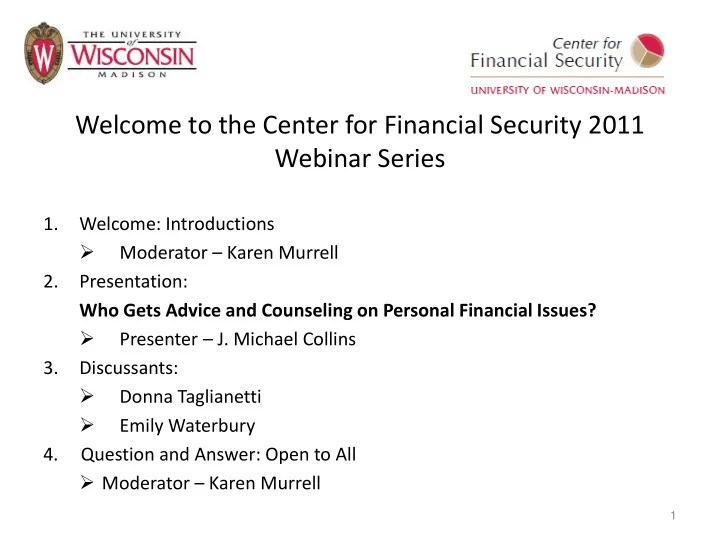

Welcome to the Center for Financial Security 2011 Webinar Series 1. Welcome: Introductions Moderator – Karen Murrell 2. Presentation: Who Gets Advice and Counseling on Personal Financial Issues? Presenter – J. Michael Collins 3. Discussants: Donna Taglianetti Emily Waterbury 4. Question and Answer: Open to All Moderator – Karen Murrell 1
Who Gets Advice and Counseling on Personal Financial Issues? The research reported herein was performed pursuant to a grant from the U.S. Social Security Administration (SSA) funded as part of the Financial Literacy Research Consortium ( SSA Grant: FLFC 19-F-10003-5-01 to the University of Wisconsin Board of Regents) . The opinions and conclusions expressed are solely those of the author(s) and do not represent the opinions or policy of SSA or any agency of the Federal Government or of the University of Wisconsin System, including Center for Financial Security. 2
1. Overview 2. Research Question 3. Data 4. Findings Overview • What are advice models? • Who are advice providers? For whom? • What role does advice play? • What kinds of advice exist? • Does advice make a difference? • Who takes up advice? 3
Framework 4
Technical Experts • Experts on narrow topic • Objective advisors – unbiased ‘pure’ advice • Credentialed • Costly 5
Rationales The cost of obtaining financial information may be lower for individuals who work with advisors. Advisors can help individuals avoid making cognitive mistakes . Advisors’ services may simply be a less costly substitute when clients’ own time and effort are more valuable than the total costs of using advisor. 6
Mixed Evidence… • Past studies show people who seek investment advice are often among the most financial capable (wealthiest, most educated, etc) • Tax advice may help people avoid tax mistakes. • Costs of advisors may be greater than any gains • Hard to assess because: – Who seeks advice matters – ‘Advice’ ranges from investment choice, tax, estate and other forms of technical information – – Maybe the case that more technical = more valuable 7
Transactional Agents • Focused on a specific transaction • Many examples – Sales, broker, real estate agent, insurance agent, etc.. • Weaker Credentials • Self-regulation • Costly? • Biased…at least potentially 8
Conflict of Interest? • Sales agents are part of a “repeated game” – reputation risk matters • Fiduciary duty role? • Advisors are compensated in a variety of ways • ‘Fee - only” advisors? – Rare – Billing for advice maybe tricky 9
Financial Counselors • Focus: Acute problem solving – Basic financial management – Intervention model • Strong nonprofit role – Public subsidies • Not (generally) compensated by pushing particular financial products 10
Counselors • Counselors assist clients when emotional stress is distorting their financial decision- making • Seems that counseling helps on credit and foreclosure issues • Experiments lacking 11
Financial Coaching • Performance improvement – Goal-based – Client directed • Coach may not be an expert • Focus on self-control & monitoring • Self-actualization – Implementation / Adherence 12
Past Studies… • Technical expert role – But few exist in market – What value is in practice? babysitter? • Many advisors are transactional – Problem or not? • Counseling – Crisis focused; subsidized • Coaching – Self- control and executive attention 13
Lot we don’t know Ex: Take Up of Advice 14
1. Overview 2. Research Question 3. Data 4. Findings Current Study • Who takes up advice? • People with financial literacy deficits or high capacity? • Data source • FINRA National Financial Capability Survey • Telephone survey of 1,488 individuals • Respondents asked if they sought advice, from what kind of advisor, and how they felt about financial advisors 15
Who received advice? Source: Tabulations of FINRA National Financial Capability Survey 16
Who received advice? Source: Tabulations of FINRA National Financial Capability Survey 17
Findings — Take Up of Advisors Factor Debt Investment Loan Insurance Tax Advisor Advisor Advisor Advisor Advisor Gender -- Male ↓ Male ↓ Male ↓ -- Income ↑ ↑ ↑ ↑ ↑ Education -- ↑ -- ↑ -- Race -- Asian ↓ -- African Hispanic ↓ American ↑ Financial -- ↑ -- ↑ ↑ Literacy Score Income Drop ↑ ↑ -- ↑ ↑ Homeowner ↓ -- ↑ -- -- Source: Tabulations of FINRA National Financial Capability Survey 18
Attitudes Toward Financial Advisors Factor Trust advisor Advisor too Met multiple expensive advisors Gender Male ↓ -- Male ↑ Income -- ↓ as income ↑ as income increases increases Education ↑ -- -- Race -- Asian ↑ -- Income Drop ↓ -- -- Homeowner ↓ -- -- Source: Tabulations of FINRA National Financial Capability Survey 19
1. Overview 2. Research Question 3. Data 4. Findings Conclusions • Advice models have potential • Proposed general framework of complements • Compensation schemes may matter • Little empirical evidence • Advice going to those with most capability – babysitter model? – Context may matter – planning vs. trigger event 20
1. Overview 2. Research Question 3. Data 4. Findings Implications / Next steps • Understanding psychology of advice • Examine Fiduciary Duty (CFPB/Dodd Act) • Field experiments needed – Beyond portfolio measures • Better understanding of counseling needed • Coaching has emerging potential to support self control; again need empirical work 21
J. Michael Collins Faculty Director, Center for Financial Security University of Wisconsin-Madison 7401 Social Science, 1180 Observatory Drive Madison, WI 53706 608-616-0369 jmcollins@wisc.edu For More Information: http://cfs.wisc.edu/ and cfs@mailplus.wisc.edu Follow us on and UWMadisonCFS
Discussant 1: Donna Taglianetti, Executive Director of Co-Opportunity Inc. donnat@co-opportunity.org 23
Discussant 2: Emily Waterbury, Consultant emilywaterbury@gmail.com 24
Questions and Answers? Thank You for your participation in the Center for Financial Security 2011 Webinar Series. For more information: http://cfs.wisc.edu 25
Recommend
More recommend